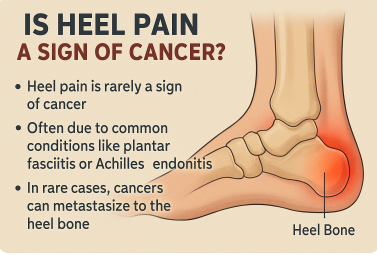1. Introduction
Heel pain is one of the most common complaints among people of all ages, especially those who are active or stand for extended periods. While most cases are linked to benign and easily treatable conditions such as plantar fasciitis or Achilles tendinitis, there are rare scenarios where heel pain may point to more serious underlying conditions — including cancer.
This article addresses the question: is heel pain a sign of cancer? While such a diagnosis is uncommon, it’s crucial to understand when heel pain warrants further medical attention. Let’s delve into the various causes of heel pain, when it might be a red flag for cancer, and how to differentiate between typical and atypical symptoms.
2. Common Causes of Heel Pain
In the vast majority of cases, heel pain is not caused by cancer. Instead, it stems from mechanical stress or inflammation. Here are the most frequent culprits:
2.1. Plantar Fasciitis
This is the leading cause of heel pain. The plantar fascia — a thick band of tissue connecting the heel bone to the toes — can become inflamed due to overuse or poor footwear. Pain is typically worst in the morning or after long periods of rest.
2.2. Achilles Tendinitis
Overuse of the calf muscles or Achilles tendon can lead to inflammation, resulting in pain near the back of the heel. This is common in runners and people who suddenly increase their level of physical activity.
2.3. Heel Spurs
Calcium deposits may develop over time, forming a bony protrusion on the underside of the heel bone. Heel spurs often occur alongside plantar fasciitis and contribute to discomfort.
2.4. Stress Fractures
Repetitive impact on the heel, especially in athletes, can lead to microscopic cracks in the heel bone. These are known as stress fractures and can cause chronic, localized pain.
2.5. Other Conditions
- Tarsal tunnel syndrome (nerve compression)
- Rheumatoid arthritis or osteoarthritis
- Heel pad syndrome (fat pad degeneration)
While these conditions can be painful and limiting, they are not typically related to cancer.
3. Is Heel Pain: A Sign of Cancer?
Though rare, certain cancers can indeed present with heel pain as a symptom. The heel bone (calcaneus) is not a common site for primary tumors, but it can be affected by metastatic cancer or bone-related malignancies.
3.1. Types of Cancer That May Cause Heel Pain
| Cancer Type | How It Affects the Heel | Additional Symptoms |
|---|---|---|
| Metastatic Lung Cancer | Spreads to bones including the heel | Chronic bone pain, fatigue |
| Breast Cancer (metastatic) | May travel to lower extremities | Swelling, unexplained pain |
| Bone Sarcomas (e.g., Osteosarcoma) | Directly originates in bone | Night pain, swelling, visible mass |
| Leukemia | Causes generalized bone pain | Fatigue, bruising, recurrent infections |
| Phosphaturic Mesenchymal Tumors | Rare, causes tumor-induced osteomalacia | Muscle weakness, low phosphate |
In these cases, heel pain usually doesn’t respond to typical treatments like rest, ice, or orthotics. The pain may worsen over time and can be accompanied by systemic symptoms such as unintended weight loss, fatigue, or swelling.
4. How to Recognize Cancer-Related Heel Pain
Since most heel pain is benign, how can you tell if it’s something more serious?
Key Differences Between Common Heel Pain and Cancer-Related Heel Pain:
| Feature | Typical Heel Pain | Potential Cancer Sign |
|---|---|---|
| Pain onset | Gradual or after activity | Sudden or worsening without clear cause |
| Pain relief | Improved with rest and support | Persistent despite rest or medication |
| Timing | Often worst in the morning | Constant or worse at night |
| Symptoms | Localized pain only | Systemic symptoms (fatigue, weight loss, fever) |
| Duration | Resolves in weeks to months | Prolonged, progressive |
If your heel pain doesn’t follow the typical pattern and is accompanied by other unusual symptoms, it’s important to consult your healthcare provider. Diagnostic imaging like X-rays, MRIs, or bone scans may be necessary to rule out or confirm the presence of a tumor.
5. Diagnostic Steps and When to Seek Help
You should seek medical evaluation if:
- The pain has lasted more than 3 months.
- You’ve noticed swelling, redness, or a lump near the heel.
- You’re experiencing unexplained weight loss or fatigue.
- The pain disrupts your sleep or daily life.
- You’ve tried conservative treatments with no relief.
Diagnostic Tools May Include:
- X-rays to identify fractures or bone abnormalities.
- MRI scans for soft tissue and bone tumors.
- Blood tests to check for cancer markers.
- Biopsy in case a suspicious mass is found.
6. Treatment Options
If heel pain is due to cancer, treatment will depend on the type and stage of the disease.
Possible Treatments:
- Radiation therapy for pain relief and tumor shrinkage.
- Surgical removal of bone tumors.
- Chemotherapy for systemic cancers.
- Targeted therapies for metastatic conditions.
- Physical therapy to improve mobility and reduce discomfort.
For non-cancer causes, physical therapy, orthotics, anti-inflammatory medications, and lifestyle changes usually suffice.
7. Conclusion
So, is heel pain: a sign of cancer? In most cases, the answer is no. Heel pain is usually a result of mechanical stress or inflammation. However, it’s important to stay aware of your body’s signals. Persistent, unexplained heel pain — especially if paired with systemic symptoms — should never be ignored.
Related Articles
Do Cough Drops Have Calories? | Full Guide on Calories in Cough Drops
When I Cough Pain in Lower Abdomen – Causes, Symptoms, Diagnosis & Treatment Explained
Lower Stomach Pain After Coughing: Causes, Treatment, and Prevention Guide
The Ultimate Guide to Chewable Cough Medicine for Kids – Safe & Effective Options

